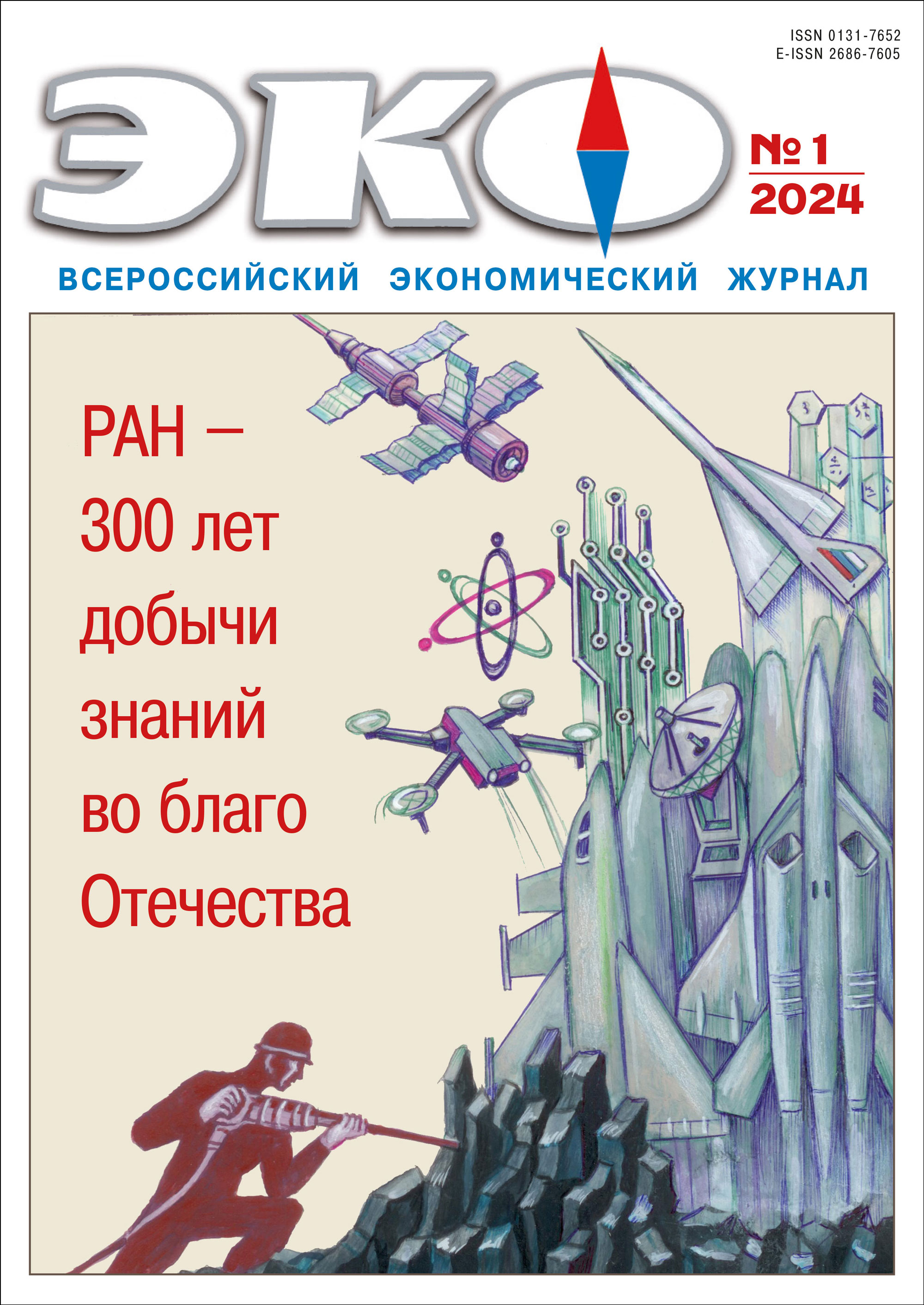Cover story: RAS – 300 years of Knowledge Extraction for the Benefit of the Fa
Energy Saving and Energy Efficiency Improvement among the Areas of Climate Policy Implementation in Russia
Published 2024-02-06
Keywords
- climate policy; sustainable low-carbon development; factors of carbon intensity of the economy; energy transition; energy efficiency; carbon-negative technologies
How to Cite
1.
Pakhomova Н, Zaedinov А. Energy Saving and Energy Efficiency Improvement among the Areas of Climate Policy Implementation in Russia. ECO [Internet]. 2024 Feb. 6 [cited 2026 Feb. 20];54(1):30-47. Available from: https://ecotrends.ru/index.php/eco/article/view/4702
Abstract
The paper addresses the feasibility of proposals to clarify climate policy priorities and improve its effectiveness based on the carbon intensity factors of the Russian economy identified by the authors, which have the most significant impact on the aggravation of the climate situation. Based on the updated data set and in the context of current international trends, the key role of pragmatic and fair energy transition, energy efficiency improvement and diversification of the country’s energy balance as the leading directions of climate policy is argued. The importance of a number of other areas of climate policy, including the application of CCUS-technologies and the implementation of agro- and forestry-climatic projects, has been clarified. The results of the study can be useful in finalizing the Operational Plan for the implementation of the Strategy of socio-economic development of Russia with low greenhouse gas emissions up to 2050, as well as for business justification of proactive decarbonization strategies.References
- Башмаков И.А. Стратегия низкоуглеродного развития российской экономики // Вопросы экономики. 2020. № 7. С. 51–74. DOI 10.32609/0042–8736–2020–7–51–74
- Брезгин В.С., Глазырина И.П. Углеродный баланс региона и климатическая политика // ЭКО. 2023. № 11. С. 25–42. DOI: 10.30680/ECO0131–7652–2023–11–25–42
- Гильмундинов В.М. Структурные особенности динамики экономики России в 2000–2013 годах и перспективы ее дальнейшего развития // Идеи и идеалы. 2014. Т. 2. № 3(21). С. 73–84.
- Голуб А., Колосницына М., Дякин Д., Шапошников Д. Восстановительный рост экономики России и выбросы парниковых газов // Экономическая политика. 2007. № 2. С. 179–195.
- Иванов А.Ю., Дурманов Н.Д., Орлов М.П., Пиксендеев К.В., Ровнов Ю.Е., Лукша П.О., Макаров И.А., Птичников А.В., Степанов И.А., Харченко М.М., Чертков Г.М. Битва за климат: карбоновое земледелие как ставка России: экспертный доклад. М.: Национальный исследовательский университет «Высшая школа экономики», 2021. 120 с.
- Мельник А., Наумова И., Ермолаев К. Трансформация управления инновационным развитием для решения проблем декарбонизации и роста энергоэффективности // Форсайт. 2023. Т. 17. № 1. С. 51–66. DOI 10.17323/2500–2597.2023.1.51.66
- Пахомова Н.В., Рихтер К.К., Ветрова М.А. Глобальные климатические вызовы, структурные сдвиги в экономике и разработка бизнесом проактивных стратегий достижения углеродной нейтральности // Вестник Санкт-Петербургского университета. Экономика. 2022. Т. 38, № 3. С. 331–364. DOI 10.21638/spbu05.2022.301
- Порфирьев Б.Н., Широв А.А., Колпаков А.Ю. Стратегия низкоуглеродного развития: перспективы для экономики России // Мировая экономика и международные отношения. 2020. Т. 64. № 9. С. 15–25. DOI 10.20542/0131–2227–2020–64–9–15–25
- Порфирьев Б.Н. Декарбонизация vs адаптация экономики к климатическим изменениям в стратегии устойчивого развития // Проблемы прогнозирования. 2022. № 4(193). С. 45–54. DOI: 10.47711/0868–6351–193–45–54
- Скобелев Д.О., Череповицына А.А., Гусева Т.В. Технологии секвестрации углекислого газа: роль в достижении углеродной нейтральности и подходы к оценке затрат // Записки Горного института. 2023. Т. 259. С. 125–140. DOI 10.31897/PMI.2023.10
- Шварц Е.А., Птичников А.В. Стратегия низкоуглеродного развития России и роль лесов в ее реализации // Научные труды Вольного экономического общества России. 2022. Т. 236. № 4. С. 399–426. DOI 10.38197/2072–2060–2022–236–4–399–426
- Шинкевич А.И. Низкоуглеродная экономика: проблемы и перспективы развития в России // Актуальные проблемы экономики и права. 2020. Т. 14. № 4. С. 783–799. DOI 10.21202/1993–047X.14.2020.4.783–799
- Dabrowski, M. (2023).The Contemporary Russian Economy: A comprehensive analysis. Cham: Palgrave Macmillan. 410 p. DOI 10.1007/978–3–031–17382–0
- Makarova, M.V., Abakumov, E.V., Shevchenko, E.V., Paramonova, N.N., Pakhomova, N.V., Lvova, N.A., Vetrova, M.A., Foka, S.C., Guzov, Iu.N., Ivakhov, V.M., Ionov, D.V., Khoroshavin, A.V., Kostsov, V.S., Mikushev, S.V., Mikhailov, E.F., Pavlovsky, A.A.,
- Titov, V.O. (2023). From carbon polygon to carbon farm: The potential and ways of developing the sequestration carbon industry in the Leningrad Region and St. Petersburg. Vestnik of Saint Petersburg University. Earth Sciences. No. 68(1). Pp. 82–102.
- DOI: 10.21638/spbu07.2023.105
- Romanovskaya, A.A., Korotkov, V.N., Polumieva, P.D. Trunov, A.A., Vertyankina, V. Yu., Karaban, R.T. (2020). Greenhouse gas fluxes and mitigation potential for managed lands in the Russian Federation. Mitigation and Adaptation Strategies for Global Change. No. 5. Pp. 661–687. DOI 10.1007/s11027–019–09885–2

